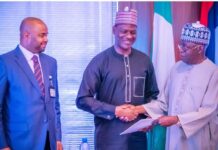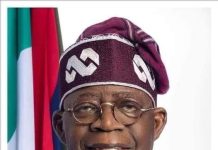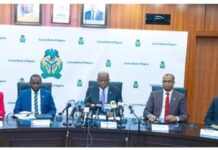I am delighted to be part of this auspicious gathering of great and articulate Nigerian students. For me, it is always a great honour to be in the midst of students and youths that I consider as members of my primary constituency.
Over the years, one of my guiding and operational philosophies is to encourage, guide and mentor youths to attain the utmost they could both for themselves and for our dear nation. This, I am strongly convinced, is the only way forward for any society to achieve greatness. And this is why, in-spite of my busy schedule; I have to keep faith with this assignment.
Great Nigerian students, distinguished guests, ladies and gentlemen, kindly permit me, at this juncture, to express my profound and sincere gratitude to the organizers of this event.
At this point, in the socio-political history of our dear nation, we need more intellectually motivated and thought-provoking gatherings like this. Every nation that is desirous of being great must encourage and invest in intellectual endeavours like the one we are having in this assembly today.
Once again, I say a big thank you to all the brains behind this event.
Distinguished guests, ladies and gentlemen, the topic: ‘The Role of Students/Youths in the Electioneering Process: Lagos State Local Government Election as a Case Study’ which I have been asked to speak on is quite apt, especially as our dear country continues to grapple with numerous socio-economic and political challenges that are threatening its corporate existence.
However, let me quickly emphasise, and rightly so, that there is nothing particularly unique about the various issues we are currently contending with as a nation. They are challenges that every nation of the world faces from time to time.
Let me, however, stress that for us to successfully confront these problems, we would need the active participation of a visionary and focused youth in the political process.
Distinguished guests, ladies and gentlemen, in addressing the topic before me, kindly permit me to make the following clarifications: One, I would like to use the word youth as connoting students as well as all younger folks. Two, I would like to substitute the word electioneering process with the political process since there cannot be electioneering without a political process.
Now, let’s move on in our discourse. Youth is best understood as a period of transition from the dependence of childhood to adulthood’s independence. Young people have unusual perspectives and a host of different ideas. By allowing them to voice their opinion, we could be opening up the political frontier. This is not only good for society, but necessary for society. If the young do not engage in politics, even if it is through pressure groups, there would be many issues with our political establishments in trying to keep policy fair and sustainable for future generations.
I strongly believe that enough is not being done for the young of today to get involved in politics and, as a large portion of our society; they should be allowed more access in politics in order to shape the world they live in.
In the new democracies of the world, the role of youth is of special importance, and in the world today, there are newer than established democracies. Young politicians are free of association with excesses of the past, and have often been prominent in demonstrations calling for an end to undemocratic culture.
However, the youth should not be swayed unnecessarily to support either the right or the left, even though youth are impressionable, they should be encouraged to explore both sides of every issue, so that when the times come for them to join the voting population, they will have a better idea of where they stand, and they will stand for what they support, not what someone has tricked them into supporting.
The youth should be more active in the political process because issues decided in the political arena affect their lives. Youth brings fresh ideas and active vitality to public affairs but also has the disadvantage of not having experienced many of the trials of life that older people have been through. It is really important to be educated about history and human nature, in order to have clear thinking.
Great Nigerian students, distinguished guests, ladies and gentlemen, let me state unequivocally that any nation that denies its youth the necessary enabling environment to actively partake in the political process does so at its own peril. Youth are the foundation of a society. Their energies, inventiveness, character and orientation define the pace of development and security of a nation.
Through their creative talents and labour power, a nation makes giant strides in economic development and socio-political attainments. In their dreams and hopes, a nation founds her motivation; on their energies, she builds her vitality and purpose. And because of their dreams and aspirations, the future of a nation is assured.
The youth represents the most vibrant and adventurous group in any society. In the words of late Dr. Nnamdi Azikiwe: “If you want to know the future of any nation, take a look at what the youths are doing presently.” Besides its strength and vigour, statistics have revealed that 60 per cent of the country’s population is youth. It is, therefore, only logical that the youth effectively make use of their number to determine the outcome of our electoral process.
In Nigeria, the youths have once played prominent role in the political process. They were, for instance, active during the anti-colonial struggle. Some of them formed the famous Nigerian Youth Movement (NYM), the Zikist Youth Movement and were prominent in trade unions and other nationalist political parties of the period.
This tradition continued in the independence period, especially in 1962 when Nigerian university students prevented the Nigerian government from signing a secret and unjust agreement with the British. This dangerous agreement, called the Anglo-Nigerian Defence Pact, would have allowed the British to leave their soldiers permanently on Nigerian soil despite our independence.
In the 60s and the 70s, youth were at the very center of governance in the country. At age 19 or so, late Ambassador M.T. Mbu was Nigeria’s High Commissioner to UK, and he was Minister of Navy at 20 plus. At his early 30s, late Chief Obafemi Awolowo was already in his bloom in the Western Region, and he was the leader of Government in the West before 40: ditto the late Nnamdi Azikiwe and Ladoke Akintola. The likes of Gowon, Murtala Muhammed, Olusegun Obasanjo, were Heads of State in their 30s. Their likes populated the civil service as super permanent secretaries while the Military Governors ranged between 20 plus to early 30s.
Distinguished guests, ladies and gentlemen, undoubtedly, the participation of youths in the political process is an asset to our country. At this juncture, however, permit me to ask a salient question: Are Nigerian youths empowered or courageous enough to take the bull by the horns?
A clear national mission with which the youth could identify has been absent most of the time. Most youth have, therefore, been misled by the manipulation of ethnicity and religion. The economic crisis which has led to youth unemployment is worsening the situation. There is a feeling of fear of the future and helplessness among the youth.
Political apathy is a cancer that the youth must brutally expunge from their system. Universally, democracy is referred to as the government of the people by the people and for the people. This emphasizes that it is the people that give impetus to democracy. In essence, democracy cannot exist without the people. It is the people that set democracy in motion. It is the people that act as the oil that galvanizes the wheel of democracy. Therefore, democracy cannot thrive where people display indifferent attitudes towards the political process. The youth inclusive!
Recent statistics from the Independent National Electoral Commission, INEC, aptly captures the existing trend in the political process in the country. According to the data, only about 35% of the over 70million who registered to vote in the 2011 general elections really participated in the voting process. This implies that over 65% of registered voters did not partake in the process that determined winners of the election.
If the youth forms the bulk of our population, it means that they are equally guilty of apathy towards the political process. This is not good enough. This is a dangerous trend that must essentially be a source of serious concern to all genuine stakeholders in the polity. This growing trend of apathy towards the electoral process has grievous implications on the prospect of democracy in the country.
For one, it ensures that leaders who attain political power via the votes of the minority rule over the majority. Second, because they don’t get to power through the votes of the majority, they tend to espouse self-seeking agenda. Third, it casts serious aspersions on the kind of democracy we practice. Furthermore, it makes elected political leaders unaccountable to the people since they did not, in the real sense, derive their coming to power from the majority of registered voters. Furthermore, it makes it hypocritical for those who did not turn out to vote to criticize those who were elected through the same process that they shunned. As it is often said, ‘you cannot eat your cake and have it’.
A lot of arguments have been put forward in defence of those who shun the political process. One of such is that votes don’t usually count in our country. This is anchored on the notion that the outcome of elections is often pre determined. There is, thus, a conviction that the electoral process is a sham. Similarly, many consider the political class undeserving of their votes because of their perceived insincerity to electoral promises. Another factor is the failure of political parties to embrace internal democracy as evidenced in the imposition of candidates and other such undemocratic tendencies.
However, irrespective of the genuineness of the argument, as painted above, it is not enough for the people to resort to shunning elections. In any case, when the majority refuse to participate in voting, that does not in any way invalidate the outcome of elections. Sadly, we all suffer the consequences of staying aloof when the wrong people get into power. Active involvement in the political process signifies that everyone is a critical stakeholder, having the best interest of the country at heart. It is a practical demonstration of being a responsible citizen.
It is, however, important that elected political leaders, at all levels, do not take the electorates for granted by not fulfilling electoral promises. Also, the practice of turning elections into a ‘do or die’ affair should be discouraged by politicians to avert marring the electoral process with violence. Additionally, political umpires, political parties, the civil society, the mass media and other stakeholders should give greater attention to voters’ education to re-enact the confidence of the people in the electoral process.
Great Nigerian students, distinguished guests, ladies and gentlemen, it is important to stress that the worst illiterate is the political illiterate. He hears nothing, and he sees nothing. He takes no part in political life; he doesn’t seem to know that the cost of living, the prices of beans, flour, rent, medicine and all depend on political decision. He even prides himself on his political ignorance, sticks out his chest and says he hates politics, he failed to realise that from his non-participation comes the prostitute, the abandoned child, the robber and worst of all, corrupt and incompetent public officials.
Distinguished guests, ladies and gentlemen, very soon, local government elections would take place in Lagos State. It offers yet another opportunity for the youth and, indeed, every prospective voter, to determine the future of the state. Local government election is, perhaps, the most crucial of all elections because it determines those that govern us at the grassroots. Being the tier of government that is closer to the people, we must, endeavour to participate actively in choosing the right people. The youth must become conscious of what the various political parties, and their respective aspirants represent before deciding on whom to vote for. Monetary considerations and other such mundane issues shouldn’t be allowed to sway your political allegiance. Remember, once you sell your votes, you have mortgaged your future.
Distinguished guests, ladies and gentlemen, I can boldly and unequivocally affirm here that the Lagos State Independent Electoral Commission, LAISEC, the electoral umpire for the local government election in the state, is well prepared to organize a transparent and hitch-free election by all standards, when the time comes. Every vote is going to be sacrosanct as fairness, justice and equity would be the watchword.
However, let me caution that the political class should desist from engaging the youths as thugs in their bid for political prominence. It is ungodly and callous for anyone to employ other peoples’ children as political hooligans while they keep their own children in safe havens.
However, the youths should shun every overture from any quarter that could turn them into anti-social agents. While it is true that things are a bit tough in the country for now, that is not enough justification for anyone to become willing tools in the hands of unscrupulous individuals who do not have their best interests at heart.
Distinguished guests, ladies and gentlemen, as I draw to a close, let me encourage our youth to be more politically involved. It is suicidal to leave the political destiny of the country in the hands of a selected few.
The future of our nation rests in the hands of the youth. But the youth cannot become relevant in the scheme of things until they become politically conscious and sophisticated.
Thank you all for your attention!
God bless Nigeria!
Long live Lagos State!
Long live Adeniran Ogunsanya College of Educatio







